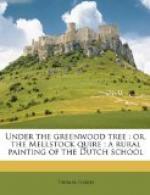A good deal of desperation became noticeable in the gallery throats and strings, which continued throughout the musical portion of the service. Directly the fiddles were laid down, Mr. Penny’s spectacles put in their sheath, and the text had been given out, an indignant whispering began.
“Did ye hear that, souls?” Mr. Penny said, in a groaning breath.
“Brazen-faced hussies!” said Bowman.
“True; why, they were every note as loud as we, fiddles and all, if not louder!”
“Fiddles and all!” echoed Bowman bitterly.
“Shall anything saucier be found than united ’ooman?” Mr. Spinks murmured.
“What I want to know is,” said the tranter (as if he knew already, but that civilization required the form of words), “what business people have to tell maidens to sing like that when they don’t sit in a gallery, and never have entered one in their lives? That’s the question, my sonnies.”
“’Tis the gallery have got to sing, all the world knows,” said Mr. Penny. “Why, souls, what’s the use o’ the ancients spending scores of pounds to build galleries if people down in the lowest depths of the church sing like that at a moment’s notice?”
“Really, I think we useless ones had better march out of church, fiddles and all!” said Mr. Spinks, with a laugh which, to a stranger, would have sounded mild and real. Only the initiated body of men he addressed could understand the horrible bitterness of irony that lurked under the quiet words ‘useless ones,’ and the ghastliness of the laughter apparently so natural.
“Never mind! Let ’em sing too—’twill make it all the louder—hee, hee!” said Leaf.
“Thomas Leaf, Thomas Leaf! Where have you lived all your life?” said grandfather William sternly.
The quailing Leaf tried to look as if he had lived nowhere at all.
“When all’s said and done, my sonnies,” Reuben said, “there’d have been no real harm in their singing if they had let nobody hear ’em, and only jined in now and then.”
“None at all,” said Mr. Penny. “But though I don’t wish to accuse people wrongfully, I’d say before my lord judge that I could hear every note o’ that last psalm come from ’em as much as from us—every note as if ’twas their own.”
“Know it! ah, I should think I did know it!” Mr. Spinks was heard to observe at this moment, without reference to his fellow players—shaking his head at some idea he seemed to see floating before him, and smiling as if he were attending a funeral at the time. “Ah, do I or don’t I know it!”
No one said “Know what?” because all were aware from experience that what he knew would declare itself in process of time.
“I could fancy last night that we should have some trouble wi’ that young man,” said the tranter, pending the continuance of Spinks’s speech, and looking towards the unconscious Mr. Maybold in the pulpit.
“I fancy,” said old William, rather severely, “I fancy there’s too much whispering going on to be of any spiritual use to gentle or simple.” Then folding his lips and concentrating his glance on the vicar, he implied that none but the ignorant would speak again; and accordingly there was silence in the gallery, Mr. Spinks’s telling speech remaining for ever unspoken.




